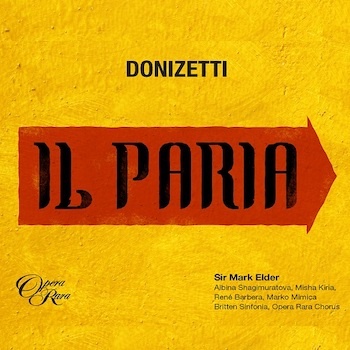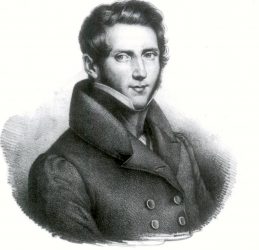Opera Preview: Donizetti’s “The Pariah” — One of the Most Significant Opera Releases of the Past Few Years
By Ralph P. Locke
 The long-forgotten Il paria (1829), a work that Donizetti himself prized more highly than many of his other works, has now been reconstructed by a scholarly team and given a splendid recording.
The long-forgotten Il paria (1829), a work that Donizetti himself prized more highly than many of his other works, has now been reconstructed by a scholarly team and given a splendid recording.
[On January 14, a major event will take place in the currently beleaguered operatic world: the public “launch” of the world-premiere recording of the first reliable edition of one of Gaetano Donizetti’s most important operas, Il paria (The Pariah; 1829). Zoom details below.]
The renowned recording company Opera Rara is releasing this new recording as a two-CD set with a full brochure that includes libretto, translation, and an insightful essay by musicologist Roger Parker. The recording was made in June 2019, but its production and release were delayed by the pandemic.
The recording’s celebratory launch will include live interviews with the conductor and two of the recording’s major stars: coloratura soprano Albina Shagimuratova, who has wowed audiences at the Met, and the equally high-flying tenor René Barbera, praised in opera houses around the world for his “effortless agility.” The interviewer will be Katherine Cooper, head of Editorial at the online firm Presto Classical. Opera fans can submit questions in advance or through the Chat bar.
Donizetti’s Il Paria (The Pariah; 1829) is a work that the composer cherished, despite the fact that, for purely practical and (it seems) political reasons, it received few performances during its initial run. He later snitched bits of it to use in several other major works, including a grand opera he wrote for Paris, Le duc d’Albe (1839). But the bulk of the opera’s music was, until now, hidden in the archives.
The plot dramatizes the noxious effects of religious prejudice and was surely meant at the time as a plea for tolerance. The “pariah” of the title is Zarete, a member of a despised caste in 16th-century India. His son Idamore has dared to join the ruling army that is fighting the Portuguese invaders and has risen to the position of general.

Donizetti as a young man. Photo: Wiki Commons
Idamore is put under great tension when he reveals to his father that he is in love with the priestess Neala, who is the daughter of the Brahmin priest, a man determined to suppress Zarete’s (and Idamore’s) people.
The opera ends tragically, with the inflexible priest putting the two pariahs—Zarete and his son Idamore—to death, while his own daughter, Neala, can only look on in dismay and declare her yearning to join Idamore in death.
The leading roles were written for three of the most astounding and acclaimed singers of the day: coloratura soprano Adelaide Tosi, tenor Giovanni Battista Rubini, and bass Luigi Lablache. Zarete, the pariah, gets some particularly splendid melodies, including a touching prayer in Act 1. But, in fact, all the main roles are extremely demanding and stirring: the tenor role (Idamore) has 13 high Cs and C-sharps in his first aria alone.
On January 8, Opera Rara began releasing three tracks from the recording on Facebook. Click here for the first of these, a great scene for Zarete, the “pariah” of the opera’s title.
I’ve heard an advance copy of the entire recording, and it is clearly one of the best and most significant new opera releases of the past few years.
[A First-Rate Donizetti Opera Gets Its First Major Recording: Attend the Launch and Meet the Conductor and the Star Soprano and Tenor on Thursday, January 14 at 1 p.m. (Eastern). I’m looking forward to meeting — thanks to the wonders of Zoom — the conductor and singers. The event takes place from 1:00 to 1:45 PM (Eastern) on Thursday, January 14.
Come join me!
The Zoom information is as follows: Meeting ID 821 2787 0775 and Passcode 277086. (For more info, write to moe@macbethmediarelations.co.uk.) Or watch on Opera Rara’s Facebook page.]
Ralph P. Locke is emeritus professor of musicology at the University of Rochester’s Eastman School of Music. Six of his articles have won the ASCAP-Deems Taylor Award for excellence in writing about music. His most recent two books are Musical Exoticism: Images and Reflections and Music and the Exotic from the Renaissance to Mozart (both Cambridge University Press). Both are now available in paperback; the second, also as an e-book. Ralph Locke also contributes to American Record Guide and to the online arts-magazines New York Arts, Opera Today, and The Boston Musical Intelligencer. His articles have appeared in major scholarly journals, in Oxford Music Online (Grove Dictionary), and in the program books of major opera houses, e.g., Santa Fe (New Mexico), Wexford (Ireland), Glyndebourne, Covent Garden, and the Bavarian State Opera (Munich).
Tagged: " Opera Rara, Albina Shagimuratova, Donizetti, Gaetano Donizetti, Il paria
